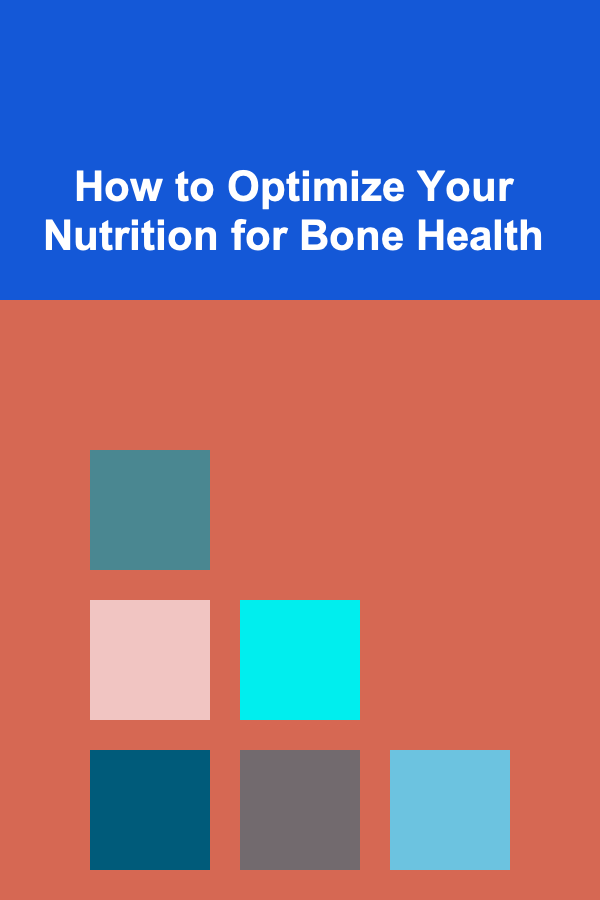
How to Optimize Your Nutrition for Bone Health
ebook include PDF & Audio bundle (Micro Guide)
$12.99$5.99
Limited Time Offer! Order within the next:

Bone health is one of the most crucial aspects of overall well-being, especially as we age. It affects mobility, quality of life, and the ability to perform daily activities. However, bone health is often overlooked until issues such as fractures or osteopenia arise. The good news is that through proper nutrition and lifestyle choices, you can optimize your bone health, reduce the risk of bone diseases like osteoporosis, and maintain strong bones throughout your life.
In this comprehensive article, we will dive into the various factors that contribute to bone health, with a focus on optimizing nutrition. We will explore the key nutrients, the role of exercise, the impact of lifestyle habits, and how these elements work together to ensure healthy bones.
The Importance of Bone Health
Bones are not static structures; they are living tissue that constantly renews itself through a process called remodeling. Osteoblasts, the bone-forming cells, lay down new bone tissue, while osteoclasts, the bone-resorbing cells, break down old tissue. This process helps maintain bone strength and integrity. However, if the breakdown of bone tissue exceeds the formation of new tissue, it can lead to weakened bones, making them more susceptible to fractures.
Proper nutrition is fundamental in supporting the remodeling process and ensuring bones stay strong and resilient. Inadequate intake of essential nutrients can contribute to weakened bones and increase the risk of conditions such as osteoporosis and osteopenia.
Key Nutrients for Bone Health
Several nutrients play critical roles in maintaining bone strength and density. These include calcium, vitamin D, magnesium, vitamin K2, phosphorus, and collagen. Let's explore each of these nutrients in detail.
1. Calcium: The Building Block of Bones
Calcium is the most abundant mineral in the human body, and approximately 99% of it is stored in the bones and teeth. It is essential for bone structure, function, and density. Calcium helps bones remain strong and flexible, and it also plays a role in muscle function and nerve transmission.
How Much Calcium Do You Need?
The recommended daily intake of calcium varies by age, gender, and life stage. Generally, adults between the ages of 19 and 50 require about 1,000 milligrams of calcium per day. For women over 50 and men over 70, the recommended amount increases to 1,200 milligrams per day. Adolescents, pregnant, and breastfeeding women also have higher calcium needs.
Sources of Calcium
The best dietary sources of calcium include dairy products such as milk, yogurt, and cheese. For those who avoid dairy, calcium-rich plant-based foods like leafy green vegetables (such as kale and bok choy), tofu, almonds, and fortified plant milks (almond, soy, or rice milk) can help meet calcium requirements.
2. Vitamin D: Enhancing Calcium Absorption
Vitamin D plays a crucial role in bone health by enhancing calcium absorption in the intestines. Without sufficient vitamin D, calcium from the diet cannot be absorbed properly, leading to weak bones. Vitamin D also regulates calcium and phosphate levels in the blood, which is necessary for healthy bone mineralization.
How Much Vitamin D Do You Need?
The recommended daily intake of vitamin D for most adults is 600 to 800 IU (International Units) per day, though this can vary depending on individual factors such as age, geographic location, and sun exposure. For older adults, the requirement may be higher to maintain bone health.
Sources of Vitamin D
Vitamin D can be obtained through exposure to sunlight, as the skin synthesizes the vitamin when exposed to ultraviolet (UV) rays. However, this process can be hindered by factors like geographic location, skin pigmentation, and sun protection practices. Therefore, dietary sources of vitamin D are also important.
Good food sources of vitamin D include fatty fish (such as salmon, mackerel, and sardines), egg yolks, beef liver, and fortified foods like cereals, orange juice, and dairy products. For those who have difficulty getting enough vitamin D from sunlight or diet, supplements can be an effective option.
3. Magnesium: Supporting Bone Structure
Magnesium is another essential mineral for bone health. About 60% of the body's magnesium is stored in the bones, where it contributes to bone structure and density. Magnesium also plays a role in calcium metabolism and helps regulate the activity of osteoblasts and osteoclasts, ensuring proper bone remodeling.
How Much Magnesium Do You Need?
The recommended daily intake of magnesium varies by age and gender. For most adults, the recommended intake is around 310-420 milligrams per day. Pregnant and breastfeeding women may need higher amounts.
Sources of Magnesium
Magnesium is abundant in many foods, especially nuts, seeds, and leafy green vegetables. Other good sources include whole grains, legumes, and avocados. For example, almonds, spinach, black beans, and pumpkin seeds are excellent sources of magnesium.
4. Vitamin K2: A Vital Bone-Boosting Vitamin
Vitamin K2 plays an essential role in bone health by activating proteins that help bind calcium to the bone matrix. It works synergistically with vitamin D to promote proper calcium utilization, directing calcium to the bones and preventing it from accumulating in the arteries, where it could cause damage.
How Much Vitamin K2 Do You Need?
There is no official recommended daily intake for vitamin K2, but the general suggestion for adults is 90 to 120 micrograms per day.
Sources of Vitamin K2
Vitamin K2 is found in animal products such as egg yolks, liver, and dairy. It is also present in fermented foods like natto (fermented soybeans), sauerkraut, and some types of cheese, such as Gouda and Edam.
5. Collagen: The Foundation of Bone Flexibility
Collagen is the most abundant protein in the body and serves as the structural framework for bones, tendons, and ligaments. Collagen fibers provide flexibility and strength to bones. As we age, collagen production decreases, which can contribute to bone fragility and a higher risk of fractures.
Sources of Collagen
Collagen can be obtained through bone broth or collagen supplements, which contain hydrolyzed collagen peptides that are easier for the body to absorb. Additionally, foods like chicken skin, fish skin, and beef or pork connective tissue are natural sources of collagen.
6. Phosphorus: A Key Component of Bone Mineralization
Phosphorus works together with calcium to form hydroxyapatite, the mineral compound that gives bones their strength and rigidity. Phosphorus also plays a role in energy production and is involved in many biochemical reactions in the body.
Sources of Phosphorus
Phosphorus is found in a wide variety of foods, particularly protein-rich foods. Good sources include meat, poultry, fish, eggs, dairy products, nuts, seeds, and legumes. Additionally, many processed foods contain phosphate additives.
The Role of Exercise in Bone Health
In addition to nutrition, regular physical activity is crucial for maintaining strong bones. Weight-bearing and resistance exercises are particularly beneficial for bone health, as they stimulate bone formation and increase bone density. Activities like walking, jogging, hiking, weightlifting, and yoga can all help promote healthy bones.
How Exercise Helps Bone Health
Exercise helps bones by creating mechanical stress that signals the body to build and maintain bone mass. Over time, this can help prevent the loss of bone density associated with aging and conditions like osteoporosis.
Weight-bearing exercises, such as walking and running, increase the impact on the bones, leading to a greater bone remodeling response. Resistance exercises, such as strength training, help stimulate bone growth and strengthen muscles that support the skeleton.
Lifestyle Factors That Affect Bone Health
Beyond nutrition and exercise, several lifestyle factors can impact bone health. Here are a few that are particularly important:
1. Avoiding Smoking
Smoking has been linked to decreased bone mass and an increased risk of fractures. Nicotine and other chemicals in cigarettes can interfere with bone cell function, reduce calcium absorption, and increase the breakdown of bone tissue. Quitting smoking can help improve bone health and reduce the risk of osteoporosis.
2. Limiting Alcohol Consumption
Excessive alcohol consumption can negatively affect bone health by interfering with calcium absorption and disrupting the production of bone-forming cells. It also increases the risk of falls and fractures. Limiting alcohol intake to moderate levels (no more than one drink per day for women and two for men) is important for maintaining strong bones.
3. Getting Enough Sleep
Adequate sleep is essential for overall health, and it plays a role in bone health as well. During deep sleep, the body undergoes processes of repair and regeneration, including bone remodeling. Poor sleep quality can lead to hormonal imbalances that negatively affect bone health.
Conclusion
Optimizing your nutrition for bone health is a multifaceted approach that includes ensuring an adequate intake of essential nutrients like calcium, vitamin D, magnesium, vitamin K2, phosphorus, and collagen. It also requires regular exercise, particularly weight-bearing and resistance training, and making smart lifestyle choices like avoiding smoking and limiting alcohol.
By adopting a proactive approach to bone health, you can significantly reduce the risk of bone diseases and maintain strong, healthy bones as you age. With the right nutrition and lifestyle habits, bone health can be optimized, ensuring a better quality of life and greater mobility as you grow older.

Client First: Essential Skills for Effective Client Relations Management
Read More
How to Organize Your Books for Easy Reference
Read More
How To Understand Bird Nests and Nesting Habits
Read More
How To Shoot in Manual Mode with Confidence
Read More
How to Create a Successful Online Presence for Your Small Business
Read More
Choosing the Right Foam Cannon for Efficient Car Washing
Read MoreOther Products

Client First: Essential Skills for Effective Client Relations Management
Read More
How to Organize Your Books for Easy Reference
Read More
How To Understand Bird Nests and Nesting Habits
Read More
How To Shoot in Manual Mode with Confidence
Read More
How to Create a Successful Online Presence for Your Small Business
Read More